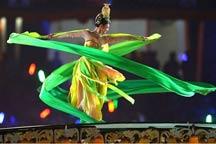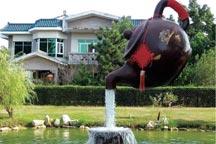Corban
Origin:
Corban is the traditional festival of Moslems. In Xinjiang, there are more than ten ethnic minorities such as Uyghur, Kazak, Uzbek, Hui, Tajik, etc. take it as their national festivals and celebrate it with various activities. “Corban" is originally an Arabic word, which contains the meaning of "sacrifice”, and it is also known as the Day to Slaughter Animals
About the festival, there is a legend. The legend has it that Ibrayin, ancestor and prophet of the Northern Arabian people, received a message from Allah in his dream to sacrifice the life of his son to show loyalty to Allah. Just at the moment when Ibrayin was about to kill his son, Allah sent a special envoy with a sheep to be killed instead of his son.
After Islam was established, Ibrayin was recognized as the holy ancestor and December 10th each year according to Islamic Calendar as Corban. Its date is not fixed in Gregorian calendar.
Activities:
Corban is the grandest, and most lively Uyghur festival. Before it, each household will make some preparations such as thorough-cleaning, cooking food and cakes, making new clothes, etc.
Muslims get up in the early morning on the day and put on their best clothes. Women also wear some jewelries and bright-colored scarves.
When the sun rises from the horizon, the deep and melodious sound of prayers is heard almost simultaneously from the famous Id Kah Mosque and perhaps a dozen of other mosques throughout the city. Thousands of people throng to the square in front of the Id Kah mosque and other mosques from all directions to celebrate the festival and pray devoutly for a better life. While praying, everyone, whether young or old, rich or poor have similar movements with same reverent.
When the ceremony is over, men go home and kill livestock, it should be healthy camels, oxen or sheep, and the choice depends on one's financial condition. After that, they go to the mosques again to have “Sama” dance, a kind of religious dance with a long history and only held in front of Id Kah mosque annually. When the dance begins, strong and deep drumbeat will draw people far and wide to come and join in the joyous activity. According to custom, women can only act as spectators, but they are as happy as the dancers. I t usually lasts for three days, during which people visit their friends, relatives and colleagues.
Fast-Breaking Festival
Roz festival is also called Fast-Breaking festival in Islamic world. It is a three-day holiday. The celebration at the end of Ramadan is called the Festival of Fast-Breaking, or Eid-ul-Fitr in Arabic. It is one of the most important festivals of the Islamic world, celebrated by the Hui, Uyghur, Kazak, Uzbek, Tajik, Tatar, Kirgiz, Salar, Dongxiang, and Bonan ethnic minorities. In China, all ethnic minorities that believe in Islamism celebrate the festival. It falls on October 1 according to Islamic calendar.
There is also a legend about the festival. It is said in order to prevent from the persecution of the heretics, ancient Arabs hid in the mountain areas in the daytime and they only lit fire and cook after the moon rose at night. Later, it evolved into a custom and is passed down to the latter generations. According to Islamic record, in the initial period of Islamism, after a successful fight, Mohammed, the founder of Islam led Muslims to pray in the open fields. After having a shower, Mohammed dressed up and gave money to his subjects to expiate his sins. From them on, it was designated as an important festival.
Every September is the fasting month of Muslims. On the 1st night of the month, Muslims will ascend the praying hall of the mosque to see if there is crescent in the sky. If they can see it, the night is the beginning of the fasting month, or they will wait one to three days to begin fasting.
Throughout the fasting month, all Muslims besides those who are too young, too old, pregnant or sick must not have any food and drinks after sunrise and before sunset. They must not do anything that is considered evil or against Allah’s will.
In the last day of the month, Muslims look for crescent moon again. The second day after they see the crescent is Fast-breaking festival. If they do not see the moon, they continue to fast for one to three days before they break fast.
It is the second grandest festivals for Muslims. Before it, every family blast "Sanzi" and gain "fried cake" to celebrate their festival. They also make new clothes, cut hair, white –paint their houses. On the fast-breaking day, every adult must bathe before worship. Then they pray together in the mosques.
Nuoruz Festival
Nuoruz Festival is a traditional holiday with a long history. In Xinjiang, all national minority believe in Islam celebrate the festival. The word came from Iranian, means "Spring Water", equating to vernal equinox (4th solar term). It falls on March 22.
Before Uyghur national minority believed in Islamism, they worshipped many god such as sun god, moon god, star god, water god, God of the Earth, fire god (stove god), ancestor god and so on.
In their mind, the star god was the main god who was in charge of one’s fortune. Among the gods Aries is one of the gods that bless them, while Pisces bring mankind and animals diseases. Therefore Muslim began a celebration at the time when Pisces descends and Aries raises, i.e. Nuoruz festival.
On that day, people of all ages get up at early morning and dress up. The head of the family lights some branches of firs and pines in the middle of the main room and whips the lighting twigs around the heads of his family members to wish them the very best of luck in the coming year. Then he puts it before the door of sock barn for domestic animals to stamp so that they will be plump and reproductive.
After sunrise, they cook a kind of porridge called "Keque" or "Chongkeque". At noon, they begin to pay visits to each other. After sunset, they treat each other with nice dishes. Then they sing and dance to their heats’ content.
After the festival, spring ploughing begins.




















